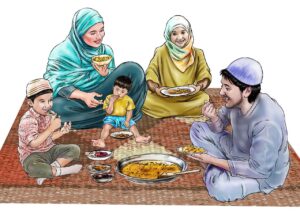Description
 Nearly 240 million children worldwide live with a disability—the majority of them in low- and middle-income countries with limited or no access to critical support and services. Close to 80 percent of children with disabilities, and up to 45 percent of children without disabilities, experience feeding difficulties, but feeding difficulties in young children’s nutrition are often overlooked. To assist nutrition and disability program managers with the design and implementation of effective nutrition programs for children with feeding difficulties and disabilities, USAID Advancing Nutrition created the Feeding and Disability Resource Bank — a collection of resources designed to address feeding difficulties and encourage disability inclusion in nutrition programs.
Nearly 240 million children worldwide live with a disability—the majority of them in low- and middle-income countries with limited or no access to critical support and services. Close to 80 percent of children with disabilities, and up to 45 percent of children without disabilities, experience feeding difficulties, but feeding difficulties in young children’s nutrition are often overlooked. To assist nutrition and disability program managers with the design and implementation of effective nutrition programs for children with feeding difficulties and disabilities, USAID Advancing Nutrition created the Feeding and Disability Resource Bank — a collection of resources designed to address feeding difficulties and encourage disability inclusion in nutrition programs.
In this event US-Aid Advancing Nutrition launched the Resource Bank, and participants learned more about the importance of addressing feeding difficulties and how this new resource can help nutrition programs become more inclusive.
Speakers
Kellie Stewart is the acting deputy director of the Office of Maternal and Child Health and Nutrition at USAID. Kellie has been with USAID for over 20 years, serving both in Washington and the field. She has led efforts on a broad range of development and emergency response programs including multi-sectoral nutrition, health system reform, maternal and child health, vector control, HIV, family planning and reproductive health.
Shona McDonald is the executive director of ShonaquipSE, Africa’s only ISO 13485 certified wheelchair manufacturer and South Africa’s first Hybrid Social Enterprise. Her life’s work and the company’s origin was inspired by her daughter, Shelly, who was born with cerebral palsy. Together with the Biomedical Engineering Department at the University of Cape Town, she designed the first South African pediatric posture support wheelchair in 1984. Since then, she has worked to ensure that, through appropriate assistive devices, knowledge to make informed choices, and agency to action them, a family of a child with a disability will never experience their child as less valued.
Christine Kirungi is the executive director of the Uganda National Association of Cerebral Palsy. She is also a trained Disability Inclusion Facilitator, and has been working in disability inclusion for over ten years. Living with cerebral palsy herself, her goal has always been to promote the realization of the rights of underrepresented persons with disabilities, especially those with cerebral palsy, and to ensure their full inclusion in society.
Alyssa Klein is a technical advisor on the USAID Advancing Nutrition Project, supporting food systems, health systems, and early childhood development activities. She provides technical and operational support to improve evidence and capacity to improve multi sectoral programming for nutrition outcomes.
Malia Uyehara is a project officer on USAID Advancing Nutrition, supporting nutrition and health systems and early childhood development activities. Her work is focused on supporting breastfeeding and breastfeeding counseling, improving adolescent nutrition, improving the nutrition of children with feeding difficulties and disabilities, and integrating nurturing care for early childhood development into the health sector.
Rachel Lassman is an occupational therapist with over 20 years of clinical experience in the UK and Uganda. She currently works at the London School of Hygiene & Tropical Medicine and is the global coordinator for the Baby Ubuntu program—providing early care and support for children with developmental disabilities. She has worked with BabyUbuntu since its inception, supporting its design, training programmes, pilot and implementation in Uganda and Rwanda.
Lauren Hughey is program officer for SPOON and has 10 years of experience coordinating and evaluating health programs focused on health promotion and program planning. She manages SPOON’s project in Zambia which aims to improve the quality of life, nutrition and feeding outcomes for children with disabilities through integrating disability-inclusive training and tools into CMMB Zambia’s Kusamala programming.
Cat Kirk is the early childhood development team lead at USAID Advancing Nutrition. She has over 10 years of experience focusing on improving the quality of health care for mothers, newborns, and children including innovative approaches to integrate support for early childhood development and early intervention for disability into the health sector.
Tafadzwa Maseva is the deputy director of the Disability, HIV and AIDS Trust in Zimbabwe. He has nearly 10 years of experience working with children with disabilities and addressing nutritional needs with Leonard Cheshire, the Zimbabwe Ministry of Primary and Secondary Education, and with the Disability, HIV and AIDS Trust.
Daniela Briñón is the founder and executive director of Zona de Sentidos, an online store of toys and assistive products to support children with developmental challenges, and Zona de Comunidad, an online platform for parents and family members of children with disabilities to share experiences and information for an increasingly diverse society. Inspired by her daughter Sofía, Daniela’s mission has always been to promote educational play, school inclusion, and the comprehensive development of children at home, at school, and with therapists.




